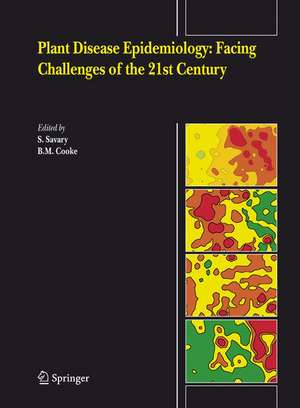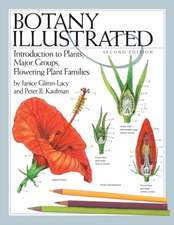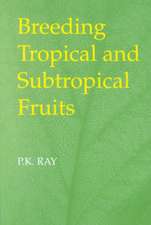Plant Disease Epidemiology: Facing Challenges of the 21st Century: Under the aegis of an International Plant Disease Epidemiology Workshop held at Landernau, France, 10-15th April, 2005
Editat de S. Savary, B.M. Cookeen Limba Engleză Hardback – 18 iul 2006
| Toate formatele și edițiile | Preț | Express |
|---|---|---|
| Paperback (1) | 637.78 lei 43-57 zile | |
| SPRINGER NETHERLANDS – 19 oct 2010 | 637.78 lei 43-57 zile | |
| Hardback (1) | 639.25 lei 43-57 zile | |
| SPRINGER NETHERLANDS – 18 iul 2006 | 639.25 lei 43-57 zile |
Preț: 639.25 lei
Preț vechi: 752.06 lei
-15% Nou
Puncte Express: 959
Preț estimativ în valută:
122.33€ • 126.94$ • 102.25£
122.33€ • 126.94$ • 102.25£
Carte tipărită la comandă
Livrare economică 17-31 martie
Preluare comenzi: 021 569.72.76
Specificații
ISBN-13: 9781402050190
ISBN-10: 1402050194
Pagini: 148
Ilustrații: VI, 138 p.
Dimensiuni: 155 x 235 x 14 mm
Greutate: 0.39 kg
Ediția:2006
Editura: SPRINGER NETHERLANDS
Colecția Springer
Locul publicării:Dordrecht, Netherlands
ISBN-10: 1402050194
Pagini: 148
Ilustrații: VI, 138 p.
Dimensiuni: 155 x 235 x 14 mm
Greutate: 0.39 kg
Ediția:2006
Editura: SPRINGER NETHERLANDS
Colecția Springer
Locul publicării:Dordrecht, Netherlands
Public țintă
ResearchCuprins
Botanical epidemiology:some key advances and its continuing role in disease management.- Framework development in plant disease risk assessment and its application.- Ecological genomics and epidemiology.- The practical considerations of scale in plant pathology.- Trends in theoretical plant epidemiology.- Establishing priorities for plant science research and developing world food security.- Disease assessment concepts and the advancements made in improving the accuracy and precision of plant disease data.- Relation between soil health, wave-like fluctuations in microbial populations,and soil-borne plant disease management.- Patterns and management of crop multiple pathosystems.
Textul de pe ultima copertă
Plant disease epidemiology deals with diseases in plant populations. During the past century, it has become a vibrant field of science, achieving significant conceptual innovations with an important impact on the management of plant diseases. Plant disease epidemiology mobilises concepts and methods from ecology, genetics, environmental physics, botany, and mathematics. It deals with cultivated and non-cultivated plants in environments where human activities may have had an impact. Now, plant disease epidemiology faces important questions. Global climate is changing at a rapid rate: will it render plant diseases more, or less, harmful to man-made ecosystems? There is much debate on this issue, partly because climate has sometimes very large effects on the local environment of growing plant canopies, and because the physical micro-environment so strongly influences plant diseases and their consequences on ecosystem functioning and performance and the way they are managed. Plant disease epidemiologists have a strong scientific tradition in studying climate-pathogen-disease relationships. Biodiversity is also of global concern. The decline of global biodiversity that is currently taking place has been referred to as the sixth great extinction process our planet has experienced during its history, but this time, it is man-made. Generations of plant pathologists, and especially, of plant disease epidemiologists, have been dealing with biodiversity. It is from this diversity that presumably the most potent instrument for disease management has been developed by plant pathologists: host plant resistance. Host plant diversity, and the disease resistance genes it harbours, can be deployed over time and space, according to epidemiological principles. Sustainable production and protection systems also need to be devised which could exploit scarcer resources sparingly, and if possible enhance the resource base. Plant disease epidemiologists alone cannot provide answers to such questions, but certainly could significantly contribute to these new strategies. This book provides an overview of some of the latest research in plant disease epidemiology from researchers at the cutting edge of this important discipline.
Reprinted from European Journal of Plant Pathology, Volume 115, No. 1, 2006
Reprinted from European Journal of Plant Pathology, Volume 115, No. 1, 2006
Caracteristici
Provides an overview of some of the latest research in plant disease epidemiology From researchers at the cutting edge of this important discipline









